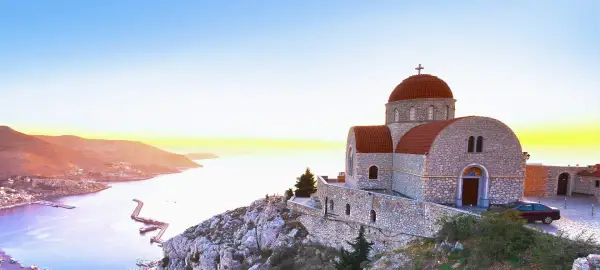Tourcode: GD2
- Overview
- Info & Inclusions
- Itinerary
- Map & Hotels
- Photos
- Dates & Prices
- Max Group Size 18
- Six lesser-visited Dodecanese islands via ferry
- Nisyros' active volcanic crater
- Medieval Rhodes & neoclassical Symi
- Athens' marble Acropolis & Parthenon
- Ancient Agora & Archaeological Museum
- Modern Exarhia neighbourhood & Central Market
- Singles friendly (view options for single travellers)
From Rhodes' Gothic citadel to the pastel-hued neoclassical facades of Symi, this island-hopping adventure explores six distinctive islands before concluding in the birthplace of democracy. A major highlight is the volcanic island of Nisyros, home to one of the world's largest hydrothermal craters where sulphurous steam vents perforate the moon-like landscape, alongside the art deco architecture of Leros where Mussolini envisioned a New Rome. We discover the sponge-diving heritage of Kalymnos, climb 500 stone steps through Symi's colour-washed harbour town, and explore Rhodes' medieval fortifications built by the Knights Hospitaller.
The tour ventures through fishing villages where traditional island life persists, then concludes in Athens where we walk the marble Acropolis, explore the Ancient Agora where Socrates debated philosophy, and discover the anarchist neighbourhood of Exarhia where student uprisings toppled military dictatorships. This journey from the southeastern Aegean to the cradle of democracy offers a richly rewarding exploration of Greece beyond the crowds.
- MealsSavour authentic flavours with included daily breakfasts and dinners at handpicked local restaurants—immersing you in local cuisine without worrying about reservations or budgets.
- Transport & Logistics
Private air-conditioned coaches and included internal ferries and flights—ensuring hassle-free travel so you can focus entirely on the discoveries ahead.
"Adventures Abroad tour leader's management and guest services managed the tour with great skill and dedication. The tour leader was on top of every move and transfer. We have not experienced any issues with logistics and had a great time."
~ JULIA O"The tour leader did an excellent job coordinating some difficult travel logistics, power outage issues and resolving problems and dealing with guests who had unrealistic expectations."
~ CYNTHIA COLLINS - Expert Guidance
Unlock insider secrets at every landmark with your full-time Tour Leader and expert local guides , all gratuities covered—no hidden tipping surprises—so you immerse fully in your destination's stories, worry-free. (Except for the tips to your tour leader at the end of your tour.)
"Amazing tour guide. Our tour guide was very well organized, Her passion, knowledge, and enthusiasm completely transformed the travel experience into something truly unforgettable..."
~ MELANIE LEMAIRE"Highly recommend every trip with Adventures Abroad. It's a well organized and well thought out adventure. The tour leaders are friendly, knowledgeable and experienced professionals. Highly recommend this company."
~ SUSAN WALL - Sightseeing & EntrancesAll entrance fees for sites visited as per the itinerary—no hidden costs—so you can explore ancient ruins and excursions with complete peace of mind.
- AccommodationsUnwind in clean, well-located 3 to 4-star hotels with private en suite facilities—handpicked for comfort and convenience after each day's discoveries—so you can rest easy knowing your stay supports the real adventure, not steals the spotlight.
- Small Group
Discover the world in small groups of up to 18 travellers plus your expert Tour Leader—unlocking spontaneity, off-the-beaten-path adventures, and genuine connections at a relaxed pace, free from crowds.
"Looking Forward to My Next Adventure The best feature of the Adventures tour was the small size that allowed the group to quickly load up, let everyone get acquainted within the first 24 hours, capitalize on unplanned surprises along..."
~ PHILIP BLENSKI"Good value for a great time I have traveled with Adventures Abroad for over 20 years now. Well thought out, interesting itineraries and the other travelers congenial and friendly. The price always seems fair and overall a..."
~ Trusted Customer - Airport Transfers For Land & Air CustomersWe handle hassle-free airport transfers for all our land and air tour customers—plus early arrivals or late departures when you book extra hotel nights directly with us for added peace of mind.
- International airfare to/from the tour.
- Tour Leader gratuities, lunches, personal items (phone, laundry, etc), and excursions referenced as 'optional'.
- Airport transfers for Land Only customers.
- Travel insurance.
- Seasonality and Weather:
In the Dodecanese Islands, including Rhodes, early October is considered shoulder seasons, offering pleasant weather ideal for island exploration. The weather is usually warm and sunny, with minimal rainfall and warm sea temperatures, making it perfect for swimming and water activities. Expect long daylight hours with plenty of sunshine, and while it's unlikely, occasional rain showers may occur. Overall, early October is a great time to explore the islands' beautiful landscapes and historic sites without the peak tourist crowds. - Transport and Travel Conditions:
This is not a cruise! We travel to/between islands via local ferries, which can range from hydrofoils to large vehicle carrying vessels. Uncontrollable factors such as weather may result in delays. Greek ferry schedules tend to change without notice; some itinerary adjustments may be necessary with late notice.
Land transport (city & island tours, port transfers) by private air-conditioned coaches, minibuses and vans, depending on group size (see 'group size'). Locally we may make short hops using multiple local taxis.
Porter service is rarely available on the islands (see 'inclusions'); you MUST be independent with your luggage, especially getting on/off ferries and at hotels.
This trip is typical of most of our European tours, which are ambitious and involve full days of travel and sightseeing. While we don't have any actual strenuous activity (ie hiking) built into the program, you will do a lot of walking on this trip, mostly be in the form of walking tours of towns and cities and short walks to dinner. Being Europe, and a hilly/mountainous area, cobbles, uneven surfaces, and slopes/stairs are common.
If you are accustomed to typical "bus tours," which rely heavily on vehicular transport for all sightseeing activities, you should be aware that this tour is considerably more active.
This program also has a strong gastronomic element, well-suited to "foodies," expert or novice, and those who enjoy savouring and lingering over a meal and sampling new things. While vegetarians are well catered for, we regret that very specific or extremely limited dietary restrictions/preferences may present a challenge on this trip.
Already been to Athens? Check out tour GD1
Am I suitable for this tour? Please refer to our self-assessment form - Activity Level: 2
These are particularly busy tours that feature a lot of moving around, sometimes by train and short journeys on local transport. Walking tours of towns and cities are leisurely but you should be prepared to be on your feet for several hours. Some of our cultural trips that occur at high altitude and/or require greater independence with baggage handling (at hotels, airports, train stations) also fall into this category.
To learn more about the Activity levels, please visit our tour styles page. - Accommodation:
Our accommodation choices reflect the charm and spectacular views of for which the Greek Isles are famous. Large chain hotels are rare in the islands, and most hotels are still smaller, family-run establishments. Our mid-range rated (international 3-star standard) island properties feature private bath, air-conditioning, wifi, and in-house breakfast.
Please note that our hotels on the smaller islands will likely feature rooms that are not uniform in size, style, and aspect, and sometimes our group may be split between two properties located near to each other.
Click on the "Map & Hotels" tab for more information. - Staff and Support:
Full-time Tour Leader, local step-on local guides in various locations. Please note that the Athens extension may be managed by a local guide (not an AA Tour Leader) for groups of 6 or less. - Group Size:
Maximum 18 plus Tour Leader
- Day 1:Arrival on RhodesToday we arrive on the island of Rhodes.
Although Rhodes serves as capital of the Dodecanese island group today, it was not one of the original twelve islands that gave the archipelago its name. The Dodecanese (literally "twelve islands") consists of these historic twelve plus over 150 smaller islands and islets scattered across the southeastern Aegean, close to Turkey's western Anatolian coast. While geographically closer to Asia, the islands remain decidedly Greek in culture and character.
Historically isolated from the mainland and from each other, the Dodecanese developed distinctive traditions. The dry climate, mountainous terrain, and poor soil on many islands forced inhabitants to become seafarers, merchants, fishermen, and sponge divers rather than farmers.
Upon arrival we transfer to our hotel located in the heart of Rhodes' medieval old city.
Overnight in Rhodos.
Included Meal(s): Dinner, if required - Day 2:Rhodes TouringRhodes preserves architecture unlike anywhere else in Greece, a legacy of the medieval period when the Knights Hospitaller wrapped the capital in massive walls to repel Ottoman attacks.
Our walking tour includes the Palace of the Grand Masters, a rare example of Gothic architecture in Greece featuring turreted towers that appear as perfect as they were in the 14th century. The fortress was possibly constructed using stones from the Colossus of Rhodes, one of the Seven Wonders of the Ancient World. When an arms store in the nearby Church of St. John exploded in 1856, the palace was destroyed, then later rebuilt by Italian occupiers as a summer retreat for King Victor Emmanuel and Mussolini.
The Knights of St John originated as a religious order founded in 11th century Amalfi. Initially ministering to pilgrims in Jerusalem, they extended their mission to tending the poor and sick of the Holy Land. Over time they became increasingly militant, joining forces with the Knights Templars and Teutonic Knights in battles against perceived threats to Christendom.
We explore the old town of Rhodes, a UNESCO World Heritage site and the largest and best preserved fortified medieval city in Europe. The massive defensive walls and labyrinthine streets reveal the strategic importance this island held for centuries.
Overnight in Rhodes.
Included Meal(s): Breakfast and Dinner - Day 3:Rhodes: Acropolis of LindosThis morning we travel by coach to Lindos to visit the Acropolis and explore this well-preserved village. The Acropolis of Athena Lindia crowns the hilltop above the settlement, overlooking St. Paul's Bay where the Apostle is said to have arrived in 58 AD. Below, narrow paved streets wind through the village, lined with traditional island architecture characteristic of the Dodecanese.
On our return journey to Rhodes, we drive across the island from the east to west coast, passing through villages and wooded areas. We ascend Filerimos Mountain for panoramic views, then visit the ruins of the ancient acropolis of Ialysos, one of three major city-states that once controlled Rhodes. From this elevated position, the coastal resort area of Ixia stretches below,
demonstrating how modern development has transformed the island's accessible coastlines.
We return to Rhodes town mid to late afternoon.
Overnight in Rhodes.
Included Meal(s): Breakfast and Dinner - Day 4:Rhodes - Ferry to SymiThis morning we take the ferry from Rhodes to nearby Symi, approximately one hour across the water.
Symi's main harbour, Yialos, presents a striking scene of neoclassical architecture cascading down the hillside in a palette of pastel hues. The amphitheatre-like setting has earned recognition as one of Greece's most beautiful harbours, a claim that holds merit upon arrival.
We arrive late morning with the balance of the day to settle in and explore the waterfront after lunch. The island's steep terrain means exploring involves considerable climbing, though the exertion proves worthwhile for the views and atmosphere of this remarkably preserved town.
Symi developed its distinctive architecture during a prosperous period when the island's shipbuilding industry and sponge diving brought wealth to local families. The neoclassical mansions reflect this maritime heritage, their tall windows and elegant proportions speaking to an era when Symi's sailors and merchants traded across the Mediterranean.
Local tavernas serve fresh Symi shrimp, small sweet prawns caught in surrounding waters and traditionally eaten whole due to their delicate shells. The island's fishing heritage remains visible in the harbour, where boats depart daily and return with catches destined for evening tables.
Overnight on Symi.
NOTE: All ferry crossing durations are approximate and subject to change depending on vessel type and scheduling.
Included Meal(s): Breakfast and Dinner - Day 5:Symi TouringThis morning we visit Chorio, the small village perched on the hilltop above Symi's main port. Rather than climbing the 500 stone steps of Kali Strata on foot, we travel by small coach, passing neoclassical houses in various states of preservation, some restored and others standing as ruins.
Like most Greek islands, Symi has been inhabited for thousands of years. An ancient acropolis has occupied this strategic hilltop since antiquity. In the 15th century, the Knights of Saint John constructed a castle over the ancient ruins, designed to protect the island against pirate raids. The fortification served its purpose until the Ottoman conquest in 1522. Though little remains of the castle today, the elevated position provides sweeping views over the harbour below.
We also visit the 18th century Monastery of Archangel Michael, known as Panormitis Monastery, one of Symi's most significant religious sites. The church and bell tower demonstrate traditional island ecclesiastical architecture, while two small museums within the monastery grounds display ecclesiastical artifacts and folk traditions.
Along the waterfront, merchants sell Symi sponges, natural sea sponges formed from silica and calcium materials harvested from surrounding waters, continuing the island's long association with the sea.
Overnight on Symi.
Included Meal(s): Breakfast and Dinner - Day 6:Symi - Ferry to NisyrosToday we ferry to Nisyros, one of the few Greek islands with an active volcano and a population of approximately 1,000.
The volcano, Greece's youngest, features one of the world's largest hydrothermal craters alongside natural hot springs with waters ranging from 30 to 60 degrees Celsius. The oldest rock formations around the island date back 160,000 years, while the youngest are approximately 15,000 years old.
In Homer's Iliad, Nisyros contributed ships to the Greek army that sailed against Troy. Later the island joined the Athenian alliance following the Persian Wars. Today the economy relies on fishing, agriculture, tourism, and the production of pumice and perlite extracted from volcanic deposits.
Our hotel will be near Mandraki, the island's small port and capital, characterized by narrow lanes winding through a medieval castle district. The town's traditional architecture and whitewashed houses create an atmosphere distinct from more developed islands.
Mandraki's Archaeological Museum displays artifacts revealing the island's long history, while the small Folklore Museum preserves photographs and objects from recent centuries. Local specialties include pythia, a chickpea-based dish similar to falafel, and koukouzina, a traditional spirit distilled from grapes and figs.
Overnight on Nisyros.
Included Meal(s): Breakfast and Dinner - Day 7:Nisyros TouringWe begin at the Volcanological Museum in Nikia village, which provides context for understanding the volcanic landscape we'll encounter today. The museum features exhibits about volcanoes in Greece and internationally. Nikia itself sits 400 metres above sea level, close enough to the volcano to offer panoramic views across the island and the Aegean.
The island's primary attraction is the volcano located at its centre, creating one of Greece's most distinctive landscapes. We visit the crater called Stefanos, measuring between 260 and 330 metres in diameter and 27 metres deep. Pyroclastic deposits and volcanic mud cover the surrounding rocks, while steam vents perforate the crater floor.
We also visit Paleokastro, the island's ancient acropolis dating from the 4th century BC. Constructed from volcanic stone, the thick defensive walls still stand above Mandraki, testament to the skill of ancient builders who worked this challenging material.
Our touring includes the village of Emporios, perched 400 metres above sea level. The Greek government has designated Emporios as having architecture of high cultural importance, the village having retained its traditional character and layout despite the
pressures of modern development.
Overnight on Nisyros.
Included Meal(s): Breakfast and Dinner - Day 8:Nisyros - Ferry to KalymnosToday we travel by ferry to the island of Kalymnos.
Kalymnos developed around a sponge fishing industry that once employed nearly all the island's men. The economic foundation collapsed in 1986 when a viral disease killed most of the sponge beds, forcing the island to adapt to alternative livelihoods including tourism and rock climbing, for which Kalymnos has become internationally known.
On arrival we visit Pothia, the island's capital and main port. The town's winding streets contain shops, cafes, and restaurants, along with several historically significant buildings. The Kalymnos Sponge Museum documents the history and culture of sponge diving through artifacts and exhibits that illuminate this dangerous profession and its central role in island life.
Kalymnian cuisine reflects both Greek and broader Mediterranean influences. Traditional dishes include fila, the local interpretation of stuffed grape leaves, and avgolemono, the classic sauce combining chicken broth, egg yolks, and lemon juice. Seasonal specialties may include Kalymnian salad featuring watermelon during summer months.
Overnight on Kalymnos.
Included Meal(s): Breakfast and Dinner - Day 9:Kalymnos TouringToday we explore Kalymnos, the third largest and most rugged of the Dodecanese islands.
The Archaeological Museum of Kalymnos houses artifacts and exhibits documenting the island's ancient past, from prehistoric settlements through classical and Byzantine periods. The collection reveals Kalymnos's strategic importance in the Aegean throughout different eras.
We visit Agios Savvas, a church perched on the mountainside offering expansive views over the town and harbour below. The elevated position provides perspective on the island's dramatic topography and its relationship to the surrounding sea.
To understand the sponge industry that defined Kalymnos for generations, we visit one of the island's sponge processing facilities. These operations demonstrate how raw sponges are cleaned, treated, and prepared for market, a process refined over centuries of maritime tradition. The industry's decline forced dramatic economic adjustments, though some operations continue serving niche markets.
The balance of the day is yours to explore independently or relax at the hotel.
Overnight on Kalymnos.
Included Meal(s): Breakfast and Dinner - Day 10:Kalymnos - Ferry to LerosOur ferry crossing to Leros takes approximately one hour, arriving at the distinctive harbour of Lakki.
Lakki presents architecture unlike any other Greek port. Founded as Porto Lagos in the 1930s during Italian occupation of the Dodecanese, the town represents authentic rationalistic architecture rarely found outside Italy. Wide streets lined with eucalyptus trees connect art deco and Italo-Mediterranean buildings of significant artistic value, creating an open-air museum of 1930s urban planning.
According to mythology, the goddess Artemis came to Leros seeking solitude. The island maintains this sense of retreat, with hidden beaches and bays scattered along its coastline, traditional and neoclassical houses in its settlements, and a pace of life that remains unhurried.
Ferry schedules permitting, we begin our exploration upon arrival. The Lakki Bay area contains remarkable examples of period architecture including a church, school, hospital, theatre, navy barracks, hotel, and circular agora with clocktower, all designed in the distinctive Italo-Mediterranean style. Mussolini envisioned Leros as a New Rome, constructing what locals called Nea Polis (New City) on former marshland. The site became the main port of Fascist Italy's navy, utilizing the largest natural deep water harbour in the Mediterranean, protected from winds by surrounding mountains.
Overnight on Leros.
Included Meal(s): Breakfast and Dinner - Day 11:Leros: At LeisureA well-deserved free day to rest up and soak in as much Dodecanese atmosphere and ambiance before our journey sadly comes to a close.
Of course your Tour Leader is available to make suggestions and provide advice on how to accomplish your activities of interest. And, of course, you’re not obliged to do anything apart from joining us for our last evening meal in the Dodecanese (and even that is negotiable ;)
A few ideas:
War buffs may consider the military museum, Deposito Di Guerra, a true gem allowing you to travel back to the past and unravel the island's fascinating history, focusing on WW2 and the Battle of Leros in 1943. In the same vein, the War Museum is housed in a tunnel built by the Italians during the Second World War.
The Historical and Folklore Museum is housed in Bellenis Tower on the way to Alinda. It includes photos from the Second World War, traditional instruments, old maps, and manuscripts.
Hikers may be drawn to a jaunt to the Pantelio Castle & Windmills, a 2.6-km loop trail near Leros town. Generally considered a moderately challenging route, it takes about an hour an average to complete (full details available on the free "AllTrails" app).
Explore fishing villages -- seafood tavernas along the shoreline, fishing boats bobbing in the sea, happy faces enjoying local delicacies, as well as freshly-caught fish, traditional cafes, and a beach with clear blue water (ideal for a swim followed by a Greek coffee).
Farther afield, one can book a boat trip on a wooden boat from Agia Marina harbour that takes you on an adventure to the neighbouring island of Lipsi and other wonderful islets.
Another highlight of your time on Leros will be discovering the island's rich culinary heritage. Dont miss out on the local mizithra cheese and honey, as well as pies, almond sweets, traditional soumada and gavafes – a fruit believed to be a relative of the guava that is only found on Leros.
Overnight on Leros.
Included Meal(s): Breakfast and Dinner - Day 12:Leros: Lakki Bay SightseeingNo visit to Leros is complete without exploring the island's castle, also known as the Castle of the Virgin. Located atop Pityki Hill 200 metres above sea level, the fortification was built by Byzantines on the site of an ancient fort. It houses the Monastery of the Virgin Mary, whose miraculous icon, according to legend, appeared from the sea and is believed to possess healing powers.
Rather than walking the 500 steps from Platanos, the island's capital and oldest settlement, we drive up through the village of Panteli. The elevated position provides sweeping views of the bays of Agia Marina and Panteli against a backdrop of low mountaintops, fields, and valleys.
The coastal town of Agia Marina has grown to merge with Platanos, creating Leros's largest settlement. We walk its cobblestone streets past neoclassical mansions showing Egyptian influences, traditional houses, and bougainvillea-filled courtyards. The architecture demonstrates the island's connections to broader Mediterranean trade networks and the prosperity certain families achieved through maritime commerce.
We visit the Archaeological Museum, which displays artifacts documenting Leros's long history from ancient through medieval periods.
Our tour continues to a local winery where we learn about wine production on the island. The visit includes a tasting followed by lunch featuring local ingredients and traditional preparations. This evening we gather for our final dinner in the Dodecanese.
Overnight in Leros.
Included Meal(s): Breakfast, Lunch and Dinner - Day 13:Leros - Fly to AthensToday we fly to Athens, the capital of Greece and the historical capital of Europe. Upon arrival we transfer to our central hotel.
Athens has a long history dating from the first settlement in the Neolithic age; in the 5th Century BC, the city’s values and civilization acquired a universal significance. In 1834, it became the capital of the modern Greek state and an attractive modern metropolis with unrivalled charm.
Flight schedule permitting, we may be able to achieve some informal introductory sightseeing upon arrival.
Overnight in Athens.
Included Meal(s): Breakfast and Dinner - Day 14:Athens: City TouringToday we enjoy a guided tour of Athens, the heart and soul of Greece.* A large part of the town's historic centre has been converted into a 3-kilometre pedestrian zone (one of the largest in Europe), leading to the major archaeological sites, reconstructing -- to a large degree -- the ancient landscape, thus allowing us to avoid the city's horrendous traffic. As such, much/most of our tour today will be conducted ON FOOT at a leisurely pace.
We start at the Acropolis (with hopes to beat the heat/crowds), near the site of the Dionysos Theatre. Constructed in the 6th century BC, it is one of the world's oldest theatres and the place where the great works of Aeschylus, Sophocles, Euripides and Aristophanes were first performed. We will also see a more recent theatre, the Odeon of Herod Atticus from the second century AD, which is still used for concerts and performances.
Ascending to the top of the Acropolis, we will see magnificent buildings dating from the 5th century BC, the Golden Age of Athens. On the highest point on the Acropolis is the Parthenon, often considered the finest monument to Greek civilization. The temple was dedicated to Athena "Parthenos," the virgin and patron goddess of the city.
After our Acropolis tour, we'll descend by foot and enter the Ancient Agora located adjacent to the Plaka, the old town of Athens. Among the numerous sights in this archaeological park are the well-preserved Temple of Hephaistos and the landmark Roman era Tower of the Winds.
Our guided tour ends with a guided visit of the Acropolis Museum, located at the foot of the Acropolis. The museum was built to house every artifact found on the rock, from the Greek Bronze Age to Roman and Byzantine Greece; nearly 4,000 objects are exhibited over an area of 14,000 square metres. After our tour you are free to wander and explore on your own or make your way back to the hotel with your Tour Leader's assistance.
* The exact order of our sightseeing in Athens may be altered by your Tour Leader depending on several variables and their judgement on how best to run today's tour. Please note that our time in Athens may be managed by a local guide (not an AA Tour Leader) for groups of 6 or less.
Overnight in Athens.
Included Meal(s): Breakfast and Dinner - Day 15:Athens: Archaeological Museum & ExarhiaThis morning we’ll be transferred (by bus) to the extraordinary Archaeological Museum of Athens, a mandatory visit for any tour of Greece! We'll enjoy a guided tour through the museum and then check out some lesser-visited corners of the city on foot and experience the vibe and energy of modern Athens.
While our morning thus has focused on the distant past -- the birth of democracy in ancient Greece and the institutions that came from this -- the balance of our day (on FOOT) reveals what is happening in modern Athens. Our walk will take us first to the Athens Central Market -- one of the liveliest places in the city, this is where many Athenians come to buy fresh vegetables and fruit, sea food, meat and poultry, nuts, grains, herbs and spices. It is also a good place to stop and have a drink, no matter the hour.
Our walking tour through the city also takes us to a district of the city known as Exarhia. Although no one would ever call it beautiful, and it certainly is not included on most tourist itineraries, Exarhia is steeped in recent history. In 1973, the student uprising which was crushed by the ruling junta of the time, eventually led to the fall of the much-hated military dictatorship. In the last couple of years, it was this Bohemian university district that often played a leading role in the uprisings against the police and the state. Anarchy and democracy – both words of Greek origin, and both playing a role in the making of tomorrow's Greece.
We return to the hotel for a bit of a break before our farewell dinner.
Overnight in Athens.
Included Meal(s): Breakfast and Dinner - Day 16:DepartureDeparture from Athens.
KALO TAXIDI/BON VOYAGE!
Included Meal(s): Breakfast
Countries Visited: Greece
*The red tour trail on the map does not represent the actual travel path.
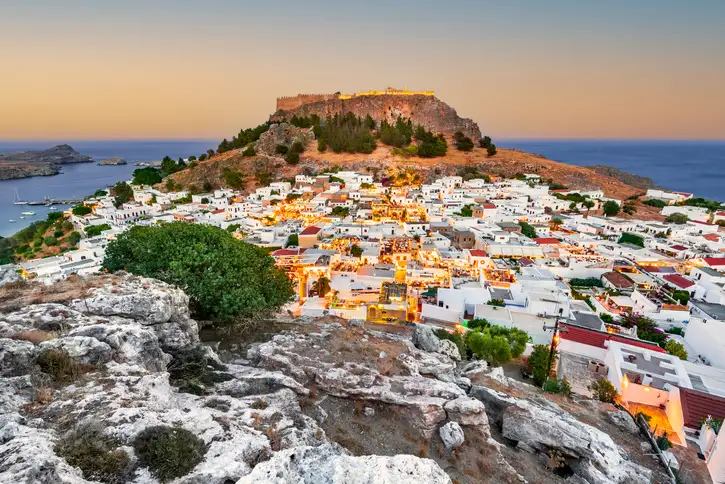
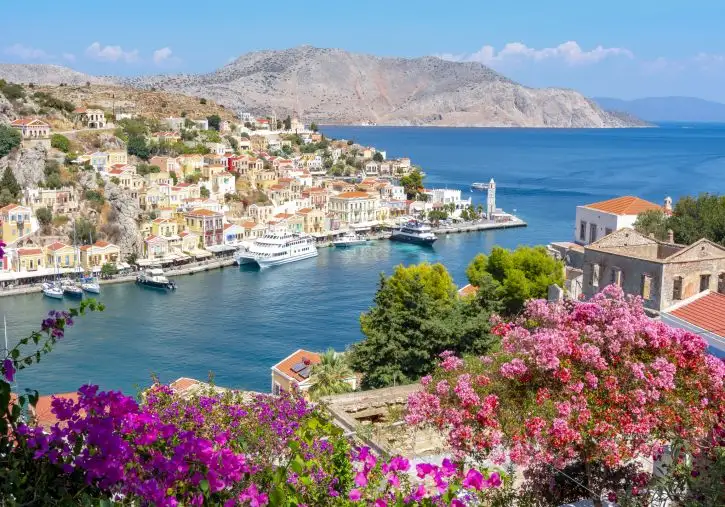
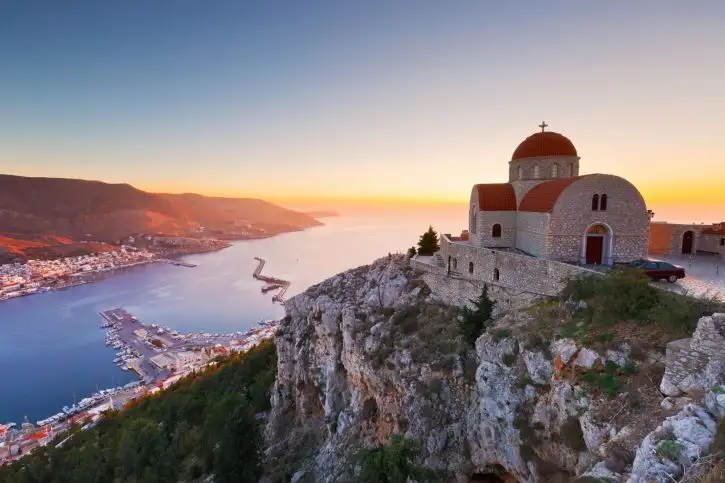
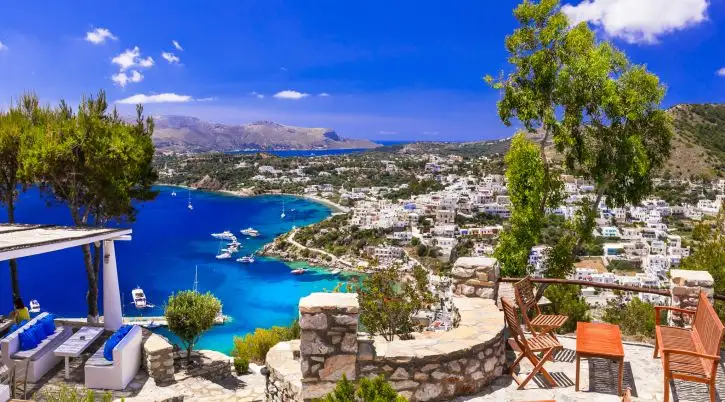
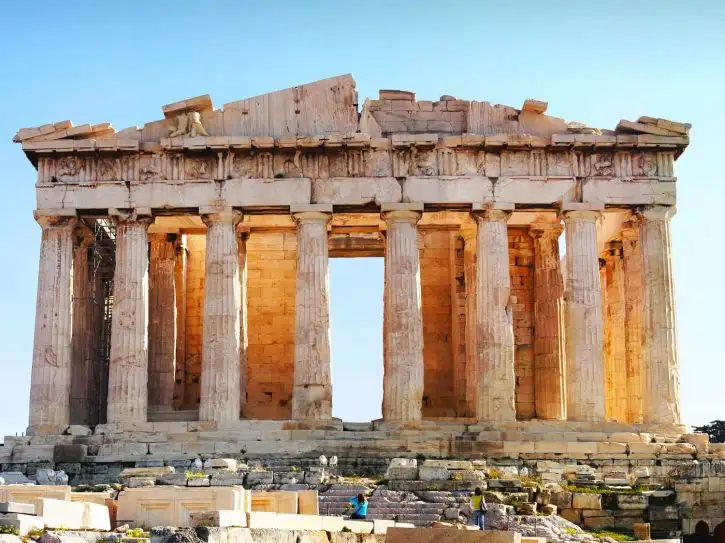
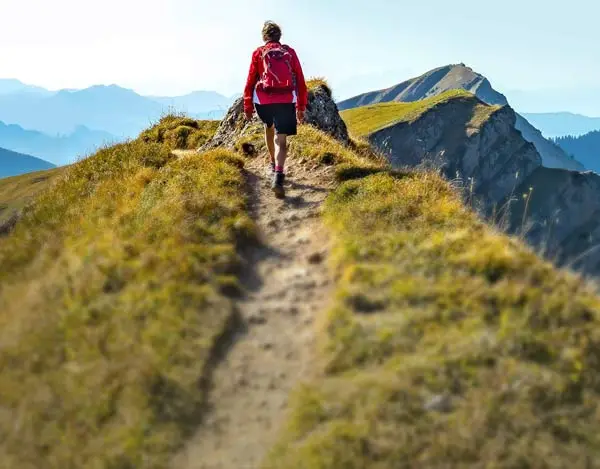
Book This Tour
- Final payment: Due 90 days prior to departure.
- Deposit: A non-refundable $500 CAD Deposit is required at booking.
- Optional Single Supplement: $1740 CAD (number of singles limited).
(View options forsingle travellers) - Transfering Tour or Date: Transferring to another tour or tour date is only permissible outside of 120 days prior to departure and is subject to a $100 CAD change fee.
(Read our cancellation policy)
Prices below are per person, twin-sharing costs in Canadian Dollars (CAD). Pricing does not include airfare to/from the tour and any applicable taxes.
Tourcode: GD2
Frequently Asked Questions
- What is the maximum number of participants on a trip?Most of our tours carry a maximum of 18 participants; some tours (ie hiking tours) top out at 16. In the event that we do not achieve our minimum complement by our 90-day deadline, we may offer group members the option of paying a "small-group surcharge" as an alternative to cancellation. If all group members agree, we will confirm the trip at existing numbers; this surcharge is refundable in the event that we ultimately achieve our regular minimum. If the small group surcharge is not accepted, we will offer a refund of your deposit or a different trip of your choice.
- Can I extend my tour either at the beginning or end? What about stopovers?Yes, you can extend your tour either at the beginning or the end and we can book accommodation in our tour hotel. Stopovers are often permitted, depending on air routing. Stopovers usually carry a "stopover" fee levied by the airline.
- How do I make a reservation? How and when do I pay?The easiest way to make a reservation is via our website; during office hours, you are also more than welcome to contact us by telephone.
A non-refundable deposit is payable at the time of booking; if a reservation is made within 90 days, full payment is required. Some trips require a larger deposit. If international airline bookings require a non-refundable payment in order to secure space or the lowest available fare, we will require an increase in deposit equal to the cost of the ticket(s).
Early enrolment is always encouraged as group size is limited and some trips require greater preparation time.
Once we have received your deposit, we will confirm your space and send you a confirmation package containing your trip itinerary, any visa/travel permit related documents, invoice, clothing and equipment recommendations, general information on your destination(s), and forms for you to complete, sign and return to us. Your air e-tickets (if applicable), final hotel list, final trip itinerary, and instructions on how to join your tour, will be sent approximately 2-3 weeks prior to departure. - What about cancellations, refunds, and transfers?Please review our cancellation policy page for details.
- I am a single who prefers my own room. What is a single supplement?All of our tours have a single supplement for those who want to be guaranteed their own room at each location.
This supplement is a reflection of the fact that most hotels around the world do not discount the regular twin-share rate for a room by 50% for only one person occupying a room. Most hotels will give a break on the price, but usually in the range of 25-30% of the twin-share rate. This difference, multiplied by each night, amounts to the single supplement.
The conventional amount can also vary from country to country and some destinations are more expensive than others for single occupancy. In order to be "single friendly," the supplements we apply are not a profit centre for us and we do our best to keep them as reasonable as possible.
On most tours we limit the number of singles available, not to be punitive, but rather because many hotels allow for only a limited number of singles; some smaller hotels at remote locations also have a limited number of single rooms available.
Please note that most single rooms around the world are smaller than twin-share rooms and will likely have only one bed. - Do you have a shared accommodation program?Yes! If you are single traveller and are willing to share, we will do our best to pair you with a same-gender roommate. Please note that should we fail to pair you, we will absorb the single supplement fee and you will default to a single room at no extra charge.
